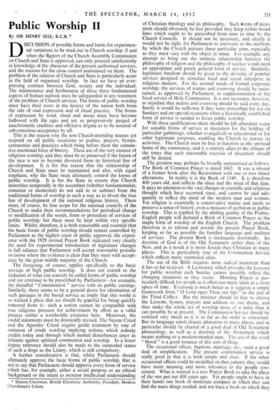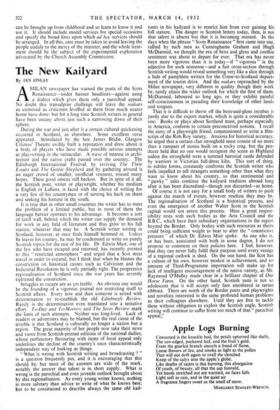Public Worship II
By SIR HENRY SELF, K.C.B. *
DISCUSSION of possible forms and limits for experimen- tal variations to be tried out in Church worship, if and when the Roport of the Church Assembly Commission on Church and State is approved, can only proceed satisfactorily in knowledge of the character of the present authorised services, and the reasons for the close control maintained on them. The problem of the relation of Church and State is particularly acute in the field of organised worship. In fact we have an ever- pressing contrast between God, society and the individual. The maintenance and furtherance of these three fundamental aspects of human outlook must be safeguarded in any treatment of the problem of Church services. The forms of public worship must have their roots in the history of the nation both from the side of oral expression and of ritual practice. The forms of expression by word, ritual and music must have become hallowed with the ages and yet so progressively purged of anachronistic crudities and offensive dogma as to be assured of sub-conscious acceptance by all.
This is the reason why the non Church-attending masses yet respond on all public occasions to psalms, prayers, hymns, ceremonies and practices which bring before them the cumula- tive emotional force of history. These are of the very essence of religious worship, and they must be so preserved if the future of the race is not to become divorced from its historical line of development. It is for this reason that the relationship of Church and State must be maintained and also, with equal emphasis, why the State must ultimately control the forms of public worship. It is for the State to ensure that Church minorities temporally in the ascendant (whether fundamentalist, romanist or modernist) do not add to or subtract from the traditional forms of worship in such a way as to divert the true line of development of the - national religious history. There must, of course, be free scope for the national councils of the Church to make their recommendations for periodical change or modification of the words, form or procedure of services of public worship; but these must be kept within very specific limits. Whilst, therefore, it is both reasonable and essential that the basic forms of public worship should remain controlled by Parliament as the highest court of public approval, the experi- ence with the 1928 revised Prayer Book indicated very clearly the need for experimental introduction of legitimate changes in full reliance that Parliament will accept reasonable periodic revisions where the evidence is clear that they meet with accept- ance by the great middle majority of the Church.
The foregoing, of course, applies specifically to the basic services of high public worship. It does not extend to the inclusion of what can scarcely be called forms of public worship and yet continue to be prescribed by Parliament—for example, the dreadful " Commination " service with its public cursings. Similarly, there seems to be a general desire for elimination of such passages in the burial service as imply that this world is so wicked a place that we should be grateful for being quickly removed from it: such a notion cannot be compatible with true religious pressure for achievement by effort as a valid process within a worthwhile existence here. Moreover, the credal statements must be drastically revised. The Nicene Creed and the Apostles' Creed require gentle treatment by way of omission of crude wording implying notions which nobody credits today and through which mental disturbances enter as irritants against spiritual communion and worship. In a lesser degree reference should also be made to the outmoded status of such a dirge as the Litany, which is still compulsory.
A further consideration is that, whilst Parliament should ultimately approve the basic forms of public worship, that is not to say that Parliament should approve every form of service which has, for example, either a social purpose or an ethical background or the intent to increase intellectual understanding
* Deputy-Chairman, British Electricity Authority; President, Modern Churchmen's Union.
of Christian theology and its philosophy. Such forms of treat- ment should obviously be free provided they keep within broad lines which ought to be prescribed from time to time by the Church Councils. It should not be necessary, and clearly it would not be right, for Parliament to intervene in the methods by which the Church pursues these particular aims, especially as they must vary with the object in mind. For example, any attempt to bring out the intrinsic relationship between the philosophy of religion and the philosophy of science would need an appropriate and purely general form of service. Similarly, legitimate freedom should be given to the devising of popular services designed to stimulate local and social enterprise in religious matters. For the normal needs of formal corporate worship, the services of matins and evensong should be main- tained, as approved by Parliament, in supplementation of the focal service of Holy Communion. It is not necessary, however, to stipulate that matins and evensong should be said every day. Surely it would be sufficient if they were prescribed for use on Sundays and on special occasions when a historically established form of service is needed to focus public worship.
With these qualifications there should be left abundant scope for suitable forms of service at discretion for the holding of particular gatherings, whether evangelical or educational or for other legitimate purposes, enabling the Church to pursue its activities. The Church must be free to function as the spiritual home of the community, and it is entirely alien to the climate of the times that such reasonable exercise of discretion should still be denied.
The position may perhaps be broadly summarised as follows. The Book of Common Prayer is dated 1662. It was a reissue of a former book after the Restoration with one or two minor alterations. In reality it is the Book of 1549. It is therefore 400 years old, and reflects the ideas and the mind of that date. It pays no attention to the vast changes in scientific and religious thought which have occurred since, and cannot be said ade- quately to reflect the mind of the modern man and woman. Yet religion is essentially a conservative matter and needs to preserve a sense of history, even a measure of archaism in public worship. This is typified by the abiding quality of the Psalms. English people will demand a Book of Common Prayer as the staple form of worship of the English Church. The problem therefore is to reform and rewrite the present Prayer Book, keeping so far as possible the familiar language and outlines of services. The present Book is inadequate doctrinally. Its doctrine of God is .of the Old Testament rather than of the New, and as a result it is more Jewish than Christian in many places. This is particularly true of the Communion Service which reflects many outmoded ideas.
The use of the Bible requires more radical treatment than it has so far received. A Lectionary which provides the Lessons for public worship each Sunday cannot possibly reflect the changing situations as they occur. Morning Prayer is par- ticularly difficult for people as it offers too many ideas in a short space of time. Evensong is much better as it suggests a simple framework from " 0 Lord open Thou our lips " to the end of the Third Collect. But the minister should be free to choose the Lessons, hymns, prayers and address on one theme, and thus make the whole act of worship more of a unity than it can possibly be at present. The Communion Service should be retained very much as it is so far as the order is concerned. But its language needs drastic alteration in many places, and in particular should be cleared of a good deal of Old Testament phraseology, as well as a doctrine of the Atonement which means nothing to a modern-minded man. The use of the word " blood " is a good instance of this sort of thing.
The occasional offices, baptism, marriage, etc.. need a good deal of simplification. The present confirmation service is really good in that it is both simple and clear. If the other occasional offices could be modelled on that pattern, they would have more meaning and more relevance to the people con- cerned. What is wanted is a new Prayer Book to take the place of the one put out 400 years ago. Yet people ought to have in their hands one book of moderate compass in which they can find the main things needed, and not least a book on which they can be brought up from childhood and so learn to know it and use it. It should include model services for special occasions and specify the broad lines upon which ad hoc services should be arranged. In all this, care must be taken to avoid leaving the people unduly to the mercy of the minister, and the whole treat- ment should be the subject of the experimental exploration advocated by the Church Assembly Commission.











































 Previous page
Previous page